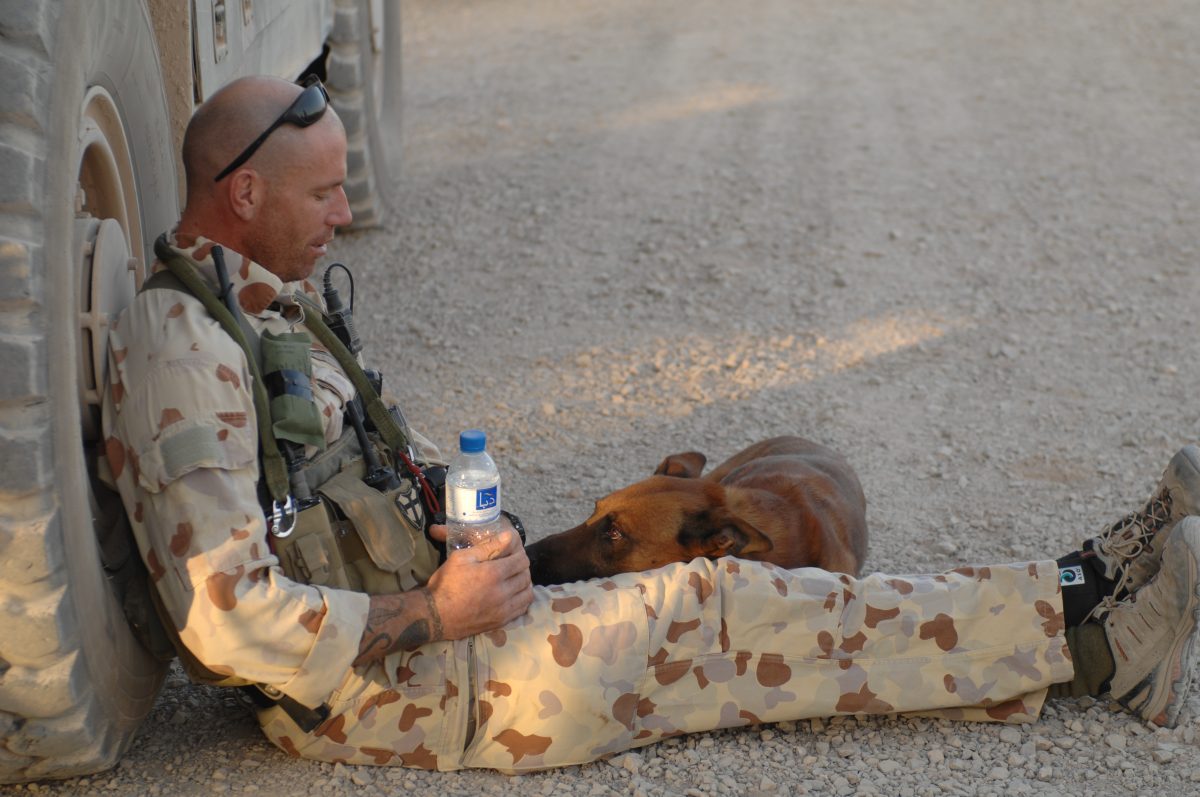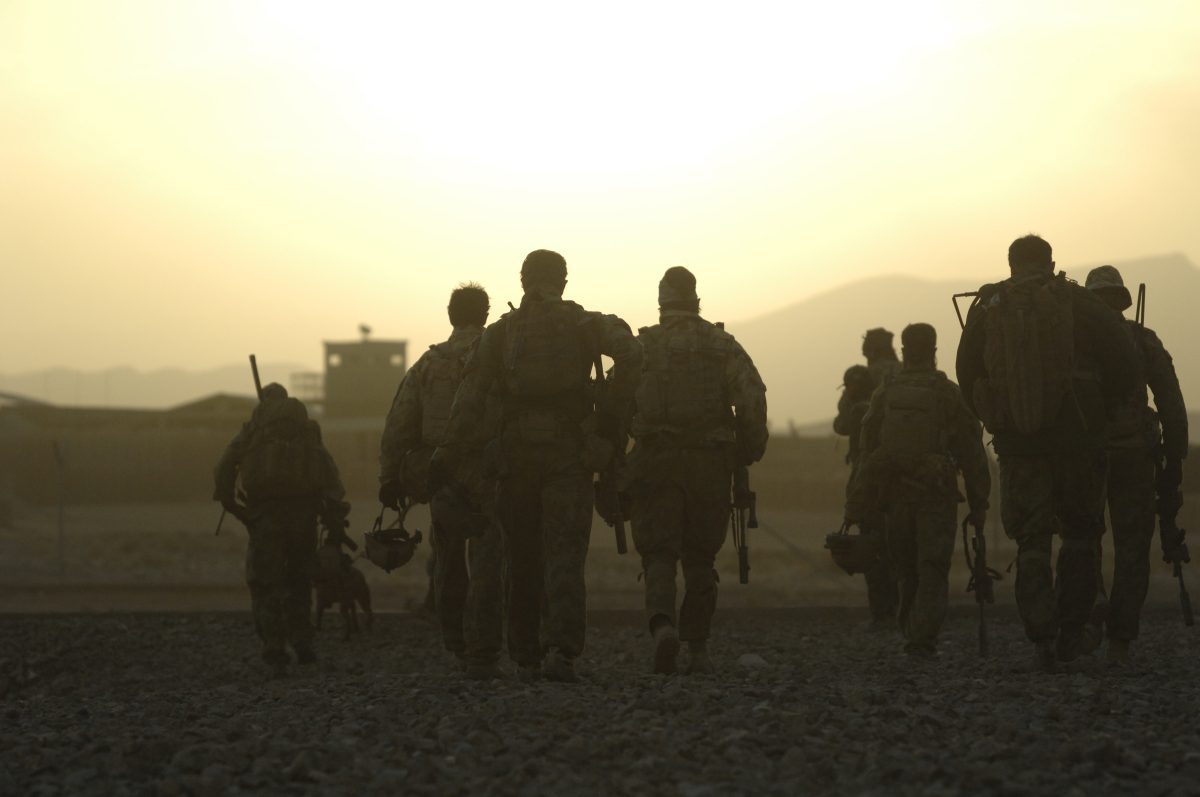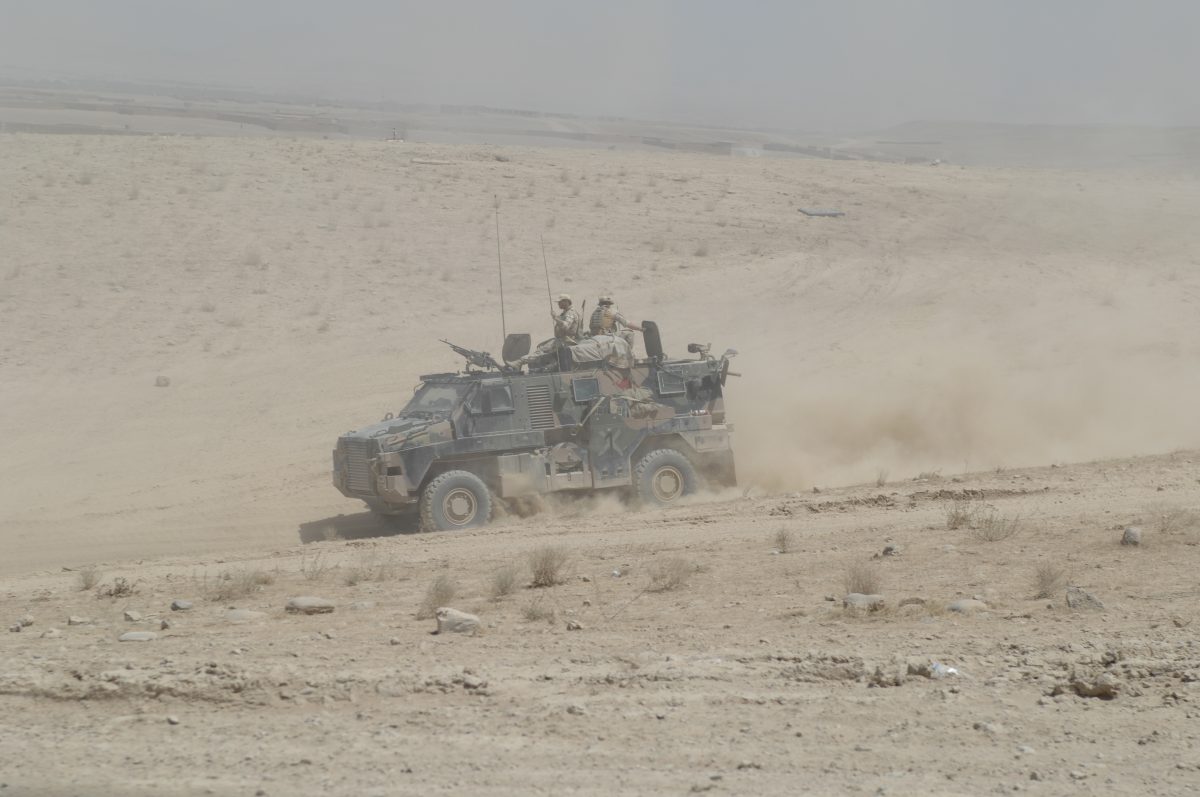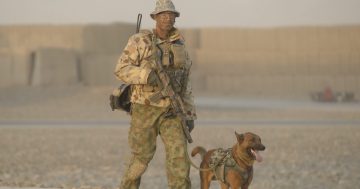
In the documentary, SAS soldier ”Horse” explains the important role dogs like Quake played in providing early warnings of ambushes. Photos: Supplied.
Members of Australia’s Special Air Service (SAS) regiment who have never previously spoken to the media will reveal what it was like to fight in Afghanistan and how they felt betrayed when returning home, in an explosive new documentary.
Bravery & Betrayal is directed by Simon Heath and funded by Wandering Warriors, a charity that supports SAS veterans and their families. The film will premiere in Perth on 26 April and be screened in cinemas across Australia, thanks also to support from online public donations.
The documentary features SAS troops, family members who lost loved ones and former Coalition prime ministers John Howard and Tony Abbott. Producers are currently in talks with former Labor prime ministers Julia Gillard and Kevin Rudd to interview them to be bipartisan in telling the story of the men.
Four of the elite soldiers, identified only by nicknames (”Vando”, ”Andy”, ”Weeksy” and ”Morts”) due to operational security reasons, gave Region an exclusive insight into what the public can learn from the production.
Betrayal
Over the past few years, there has been considerable media coverage of the Australian Defence Force (ADF) Afghanistan Inquiry, led by Major General Paul Brereton, which investigated alleged war crimes involving a small number of SAS.
“Sections of the media, senior ADF leaders, and some politicians have condemned us, labelling us ‘war criminals’ despite allegations being unproven, while distancing themselves from broader accountability,” Vando said.
“Sensationalist media coverage, often based on rumour or falsehoods, has damaged the reputation of the SAS, severely impacting the mental and physical wellbeing of veterans and their families.”
Soldiers told Region they felt those questioned by the inquiry were denied due process and procedural fairness, while the press reporting unfairly tarnished all 400 SAS troops.
“Since returning, many of us have felt scapegoated,” Andy said.
“The media narrative often paints with a broad brush, and public perception follows suit. The presumption of guilt surrounding accusations of war crimes overshadowed decades of dedication, commitment and exemplary service. Some Australians have shown support, many have shown disdain.”
Weeksy said: “At the first sign of any rumour of things not going how senior leadership expected, they threw the soldiers under the bus, but in the same breath took no responsibility for this themselves as leaders.”
What the SAS really does
Director Simon Heath says this documentary is not about refuting the Brereton inquiry allegations.
“It’s about telling the big picture of the 400 SAS guys who served in Iraq and Afghanistan,” he said.
“You learn about the bravery of their experience, like parachuting behind enemy lines in Afghanistan. The war for them wrapped up in 2014. That’s when things started to slowly shift. The media didn’t ask for stories of bravery, of protecting Afghanis and Australian aid workers … a lot of them have been cast adrift and are doing it tough.”
His film outlines details of SAS bravery and sacrifice that many have not heard.
“While the public often imagines us as Hollywood-style action heroes, the reality is more grounded – relentless training, precision, and executing missions under conditions that are far more complex than they appear from the outside,” Andy said.
“We shouldered the heaviest combat to alleviate pressure on our fellow diggers and to support the broader mission objectives. These deployments required unwavering commitment, extraordinary resilience, and the ability to operate under some of the most challenging and high-risk conditions imaginable.
“The prevailing misconception is that Australian politicians and military leadership provided adequate guidance, but the reality is they failed to lead in Afghanistan effectively. We were sent repeatedly on complex and high-risk operations without clear strategic guidance or sufficient resources.”

The documentary explains why many SAS troops feel betrayed after risking their lives in Afghanistan.
Lack of support when returning home
The documentary also chronicles the battles SAS troops have had to fight after returning to Australia.
Vando described post-conflict support for soldiers as “grossly inadequate”.
“Soldiers endured relentless deployments for a decade with no rest, only to face retraumatisation during the Brereton inquiry without adequate psychological safeguards,” he said.
“This lack of ethical consideration for their mental health is a glaring failure that must be acknowledged and addressed.”
‘Overwhelming’ strain on wives and families
The soldiers, however, say they were far more distressed by the impact the past decade has had on their parents, partners and children.
“Imagine having to explain to your teenage daughters that you or your friends did not murder two children, all while facing the fury of global media outrage,” Andy said. ”This despite [those in power] knowing the accusation was false and failing to publicly refute it.
“The strain on families has been overwhelming. Wives, children and parents endured the anguish of waiting for us to return safely, only to witness us being vilified upon coming home. This mistreatment has had far-reaching consequences, destabilising relationships, impacting mental health, and undermining family stability.”
Morts said the feeling of loss could be difficult to articulate.
“That story is best told by those left behind. You will see widows and children of the fallen in our documentary, the pain in their eyes and their voices is real and palpable,” he said.
“Returning soldiers will always return a different person, they will see the world through different eyes, not always negative, but those changes will be noticeable. Families often have trouble navigating those changes. Throw in misguided media vilification and a lack of senior leadership support and you end up where we are. With questions like, ‘Was it worth it?’”

Director Simon Health says many in the media were not interested in stories of extraordinary bravery from the SAS troops.
Purpose of the documentary
The documentary aims to set the record straight, says Andy.
“It’s to honour the service and sacrifices of SAS soldiers, expose systemic failures, and advocate for meaningful reforms in the treatment of veterans, both during and after their service,” he said.
“It seeks to highlight the urgent need for a royal commission into the failures of strategic leadership during the Afghanistan War, holding those at the highest levels accountable for their decisions and ensuring lessons are learned for future operations.”
Morts believes the story of Afghanistan needs a counterpoint to that portrayed by some sections of the popular media.
“It is hoped that this documentary can provide an historical artefact that Australians can use, for generations to come, in making their own mind up on what Afghanistan was and wasn’t,” he said.
“As a community, we must fully explore what we got right and what we got wrong. Unless we learn those lessons, we run the risk of being here again in the future.”
If you’d like to help the Wandering Warriors finish the film and share it with a wide audience, donations can be made on the documentary’s Give Easy page. Updates and information on where and how you can watch it after its premiere will be provided through Region’s (free) subscription service and on the Bravery & Betrayal website.
Original Article published by Oliver Jacques on Riotact.








